A U.S Marine veteran from Southern California was part of a group of dissidents wielding machetes and fake guns when they stormed North Korea's embassy in Madrid and tied up and beat officials inside, federal prosecutors alleged in a criminal complaint released Tuesday.
Spain is seeking to extradite Christopher Philip Ahn on charges including robbery, illegal restraint and criminal organization. Judge Jean Rosenbluth denied bond for Ahn during a Los Angeles court hearing attended by his wife, mother and about two dozen other supporters.
The judge also denied a defense request to keep the complaint sealed. The Associated Press wrote a letter to Rosenbluth strongly objecting to keeping documents private, though the judge said she was inclined to make them public anyway since Ahn's name was already reported.
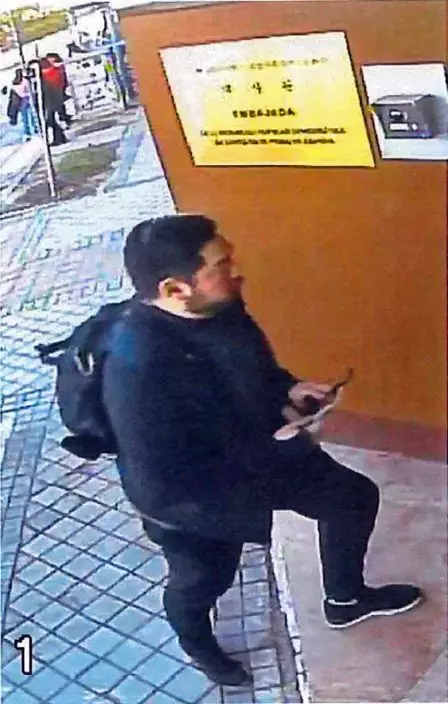
This Feb. 22, 2019 image from surveillance video at the North Korean Embassy to Spain in Madrid, contained in Department of Justice documents presented by federal prosecutors, shows U.S. Marine veteran Christopher Ahn as he prepares to enter the embassy. Ahn, suspected of involvement in a mysterious dissident group's February raid on North Korea's embassy, has been denied bond by a federal judge and must stay in custody. Ahn appeared in a Los Angeles courtroom on Tuesday, April 23. The charges against Ahn haven't been made public. (U.S. Department of Justice via AP)
Prosecutors said Ahn was arrested during a raid last week on the Los Angeles apartment of a co-defendant, Adrian Hong Chang, a leader of the Free Joseon group. Hong Chang was not at home and has not been arrested.
Free Joseon, also known as the Cheollima Civil Defense group, styles itself as a government in exile dedicated to toppling the ruling Kim family dynasty in North Korea.
Hong Chang knocked on the embassy's door Feb. 22 and asked to speak to a specific official, according to court papers filed by the U.S. Attorney's Office. After he was let inside and a worker walked away, Hong Chang opened the door and let in six other members of the group, including Ahn, according to the documents.
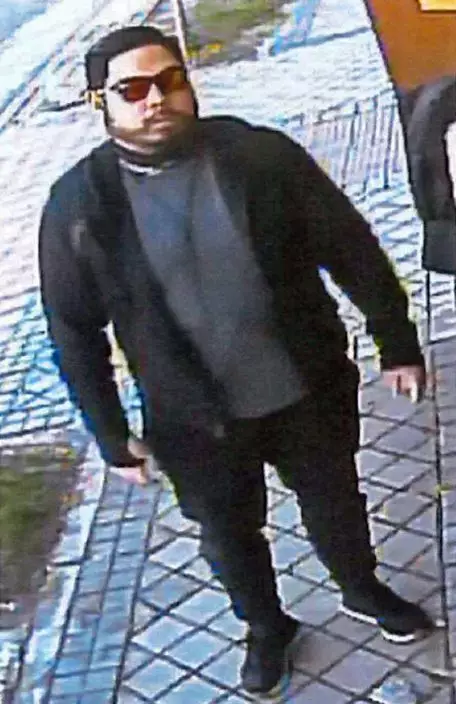
This Feb. 22, 2019 image from surveillance video at the North Korean Embassy to Spain in Madrid, contained in Department of Justice documents presented by federal prosecutors, shows U.S. Marine veteran Christopher Ahn as he prepares to enter the embassy. Ahn, suspected of involvement in a mysterious dissident group's February raid on North Korea's embassy, has been denied bond by a federal judge and must stay in custody. Ahn appeared in a Los Angeles courtroom on Tuesday, April 23. The charges against Ahn haven't been made public. (U.S. Department of Justice via AP)
The group — armed with machetes, iron bars, knives and fake guns — beat some of the workers and then tied them up with shackles and cables, prosecutors alleged. They put bags over some of the workers' heads, beat them and threatened them with the metal bars and guns, according to the court papers.
The wife of one of the embassy officials tried to escape from a terrace but fell and was injured. Another woman and a young child were guarded as the attack continued.
When Spanish police officials arrived, Hong Chang answered the embassy's front door — posing as an embassy official and wearing a pin featuring North Korea's leader on his jacket — and told the officers there was no commotion inside.
The hostages were beaten and held for hours as the group stole several "pen drives," two computers, two hard drives and a cell phone, the complaint said.
Five of the members of the group fled in three vehicles they stole from the embassy, documents said. The vehicles were later found abandoned.
As the other members of the group fled in the stolen embassy vehicles, Hong Chang hailed an Uber using the alias "Oswaldo Trump." He canceled the first ride because the Uber pulled up near police and summoned another a few minutes later behind the embassy, taking a ride to Toledo, Spain.
Three North Korean students went to the embassy, jumped over a fence and ran inside to free the workers who were still tied up.
Outside the embassy, police found a fake Italian identification card with the name "Matthew Chao" and a photo of Hong Chang. Police in Madrid also found four machetes, the imitation pistols, cable ties and a "defensive spray," the documents said. Police believe Hong Chang had purchased the items the morning of the attack.
Hong Chang's attorney, Lee S. Wolosky, didn't immediately respond Tuesday to a call seeking comment.
The day after the attack, Hong Chang retuned to the U.S., flying from Lisbon, Portugal, and met with agents at the FBI's office in New York. During the interview, he turned over the items he stole from the embassy, the complaint said.
Hong Chang also told the agents he had "carried out the raid on the North Korean Embassy in Spain days before," and provided the FBI with details, the papers said.
He told agents that he and members of the group had carried — but did not display — knives and airsoft pistols.
After the attack, Hong Chang also met with FBI agents at the bureau's office in Los Angeles and told them that Christopher Ahn, a former Marine, had participated in the attack.
One of the embassy workers later identified Ahn as an attacker from his LinkedIn profile picture.
When Ahn was arrested, U.S. Marshals found a loaded .40 caliber handgun hidden in his waistband. His attorney, Callie Steele, said in court that the gun was licensed and Ahn carried it after the FBI informed him that there were threats against his life.
In court documents, U.S. prosecutors said Ahn had a "strong incentive to flee" because he faces more than 10 years in prison if he's extradited and convicted in Spain.
Steele denied Ahn was a flight risk because he was a devoted caregiver to his ill mother and 96-year-old grandmother, who is blind. The Los Angeles native received an honorable discharge from the Marines, earned an MBA from the University of Virginia, and has no criminal record, Steele said. The defense asked for home confinement during the extradition process but the judge denied the request and remanded Ahn back into custody.
He was ordered to return to court for a status hearing on July 18.
Follow Weber at https://twitter.com/WeberCM and Balsamo at https://twitter.com/MikeBalsamo1 .
VENICE, Italy (AP) — Under the gaze of the world’s media, the fragile lagoon city of Venice launched a pilot program Thursday to charge day-trippers a 5-euro (around $5.35) entry fee that authorities hope will discourage visitors from arriving on peak days and make the city more livable for its dwindling residents.
Visitors arriving at Venice's main train station were greeted with large signs listing the 29 dates through July of the plan's test phase, as well as new entrances separating tourists from residents, students and workers.
Stewards were on hand to politely guide anyone unaware of the new requirements through the process of downloading the QR code to pay the fee.
“We need to find a new balance between the tourists and residents,’’ said the city’s top tourism official, Simone Venturini. “We need to safeguard the spaces of the residents, of course, and we need to discourage the arrival of day-trippers on some particular days.”
Arianna Cecilia, who lives in Rome and was visiting Venice for the first time with her boyfriend, said it felt “strange" to have to buy a ticket to enter a city in her native Italy, and then pass through a tourist entrance.
The couple were staying in nearby Treviso, and had paid the fee and downloaded the QR code as required prior to arrival.
Workers in yellow vests carried out random checks at the train station, and anyone caught faces fines of 50 euros to 300 euros — though officials said “common sense” was being applied for the launch.
The requirement applies only for people arriving between 8:30 a.m. and 4 p.m. Outside of those hours, access is free and unchecked.
Venice has long suffered under the pressure of over-tourism, and officials hope the pilot project can help provide more exact figures to better manage the phenomenon.
The city can track the number of hotel visitors — which last year numbered 4.6 million, down 16% from pre-pandemic highs. But the number of day visitors, which make up the majority of the crowds in Venice, could only be estimated until recently.
A Smart Control Room set up during the pandemic has been tracking arrivals from cell phone data, roughly confirming pre-pandemic estimates of 25 million to 30 million arrivals a year, said Michele Zuin, the city’s top economic official. That includes both day-trippers and overnight guests.
But Zuin said the data is incomplete. “It’s clear we will get more reliable data from the contribution” being paid by day-trippers, he said.
Venturini said the city is strained when the number of day-trippers reaches 30,000 to 40,000. Its narrow alleyways are clogged with people and water taxis packed, making it difficult for residents to go about their business.
Not all residents, however, are persuaded of the efficacy of the new system in dissuading mass tourism. Some say more attention needs to be paid to boosting the resident population and services they need.
Venice last year passed a telling milestone when the number of tourist beds exceeded for the first time the number of official residents, which is now below 50,000 in the historic center with its picturesque canals.
“Putting a ticket to enter a city will not decrease not even by one single unit the number of visitors that are coming,’’ said Tommaso Cacciari, an activist who organized a protest Thursday against the measure.
“You pay a ticket to take the metro, to go to a museum, an amusement park; you don’t pay a ticket to enter a city. This is the last symbolic step of a project of an idea of this municipal administration to kick residents out of Venice,” he said.
Venturini said about 6,000 people had already paid to download the QR code, and officials expect paid day-tripper arrivals Thursday to reach some 10,000.
More than 70,000 others have downloaded a QR code denoting an exemption, including to work in Venice or as a resident of the Veneto region. People staying in hotels in Venice, including in mainland districts like Marghera or Mestre, should get a QR code attesting to their stay, which includes a hotel tax.
The tourist official says interest in Venice's pilot program has been keen from other places suffering from mass tourism, including other Italian art cities and cities abroad such as Barcelona and Amsterdam.
Marina Rodino, who has lived in Venice for 30 years, is opposed to the new plan. She was passing out mock EU passports for “Venice, Open City,” underlining the irony of the new system, and challenging its legal standing with citations from the Italian constitution guaranteeing its citizens the right to “move or reside freely in any part of the national territory."
Rodino has seen her local butcher close and families leave her neighborhood near the famed Rialto Bridge as short-term apartment rentals spring up. But she said the new entrance fee requirement will still allow young people to flood the city in the evening for often rowdy gatherings.
“This is not a natural oasis. This is not a museum. It is not Pompeii," she said. “It is a city, where we need to fight so the houses are inhabited by families, and stores reopen. That is what would counter this wild tourism.”
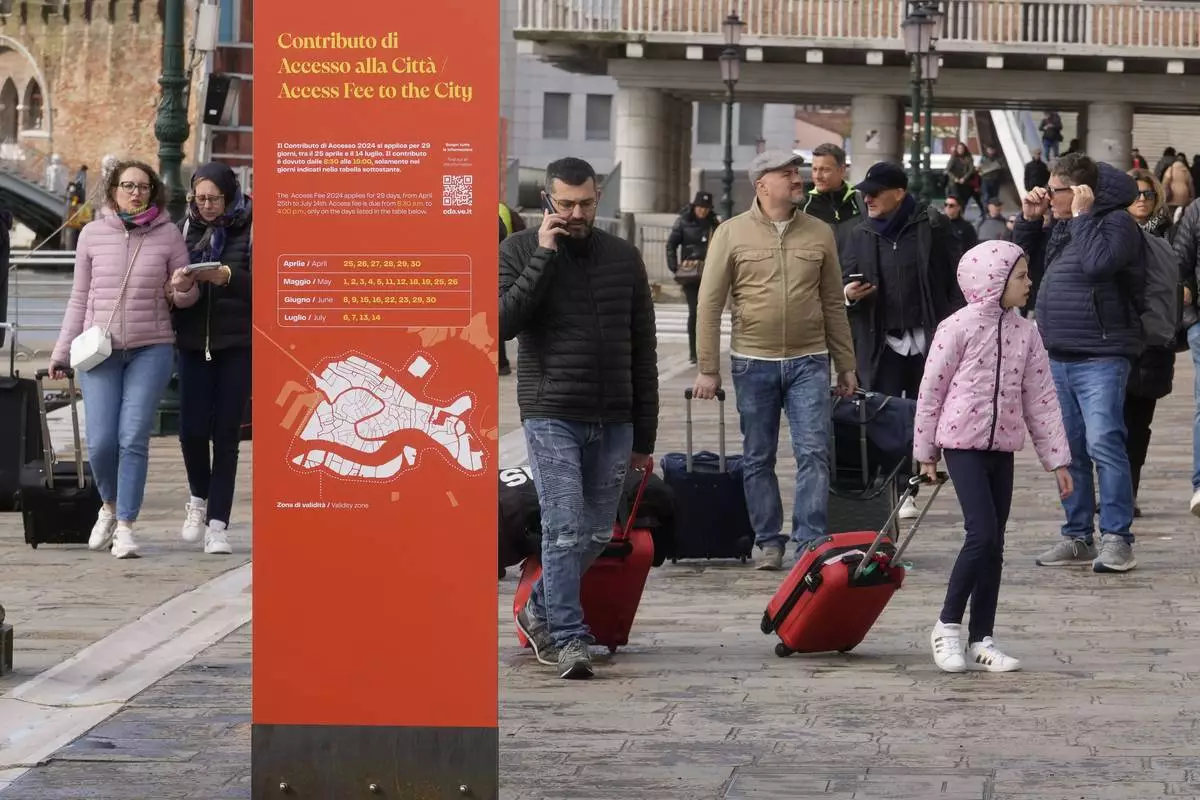
Tourists arrive in Venice, Italy, Thursday, April 25, 2024. The fragile lagoon city of Venice begins a pilot program Thursday to charge daytrippers a 5 euro entry fee that authorities hope will discourage tourists from arriving on peak days. The daytripper tax is being tested on 29 days through July, mostly weekends and holidays starting with Italy's Liberation Day holiday Thursday. Officials expect some 10,000 people will pay the fee to access the city on the first day, downloading a QR code to prove their payment, while another 70,000 will receive exceptions, for example, because they work in Venice or live in the Veneto region. (AP Photo/Luca Bruno)
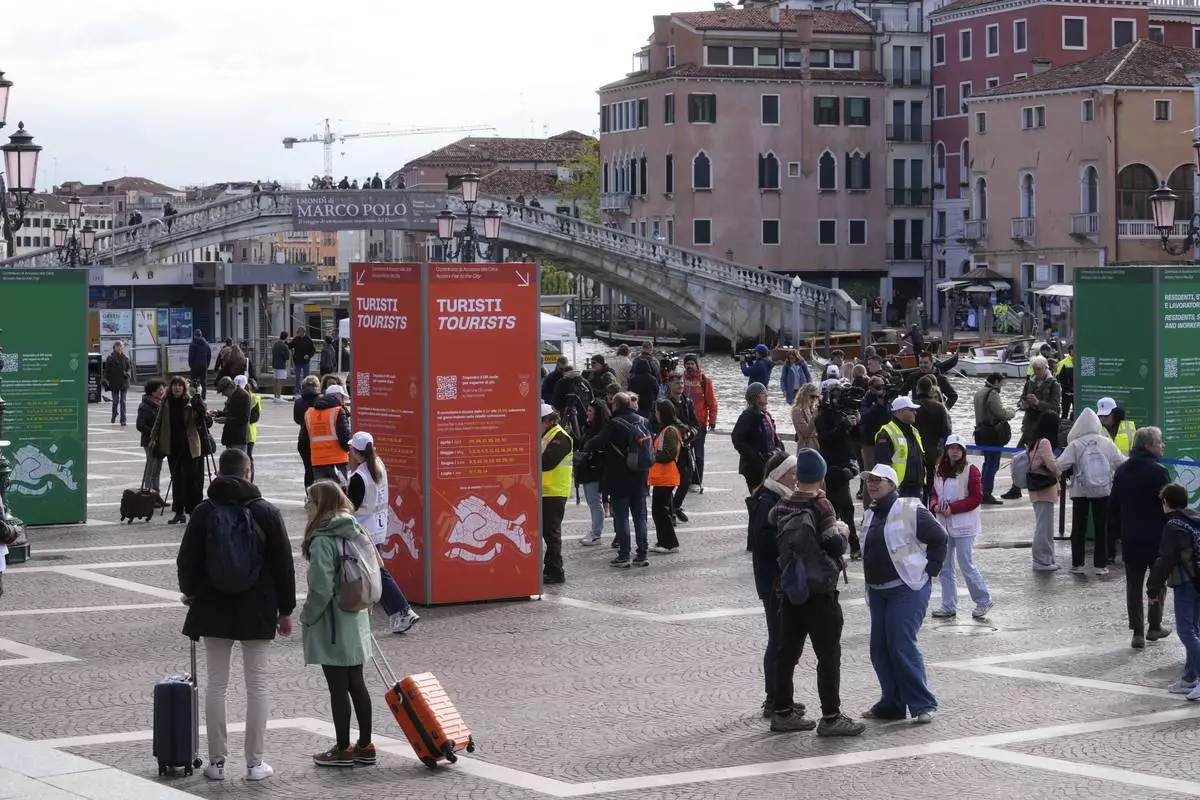
Stewards check tourists QR code access outside the main train station in Venice, Italy, Thursday, April 25, 2024. The fragile lagoon city of Venice begins a pilot program Thursday to charge daytrippers a 5 euro entry fee that authorities hope will discourage tourists from arriving on peak days. The daytripper tax is being tested on 29 days through July, mostly weekends and holidays starting with Italy's Liberation Day holiday Thursday. Officials expect some 10,000 people will pay the fee to access the city on the first day, downloading a QR code to prove their payment, while another 70,000 will receive exceptions, for example, because they work in Venice or live in the Veneto region. (AP Photo/Luca Bruno)
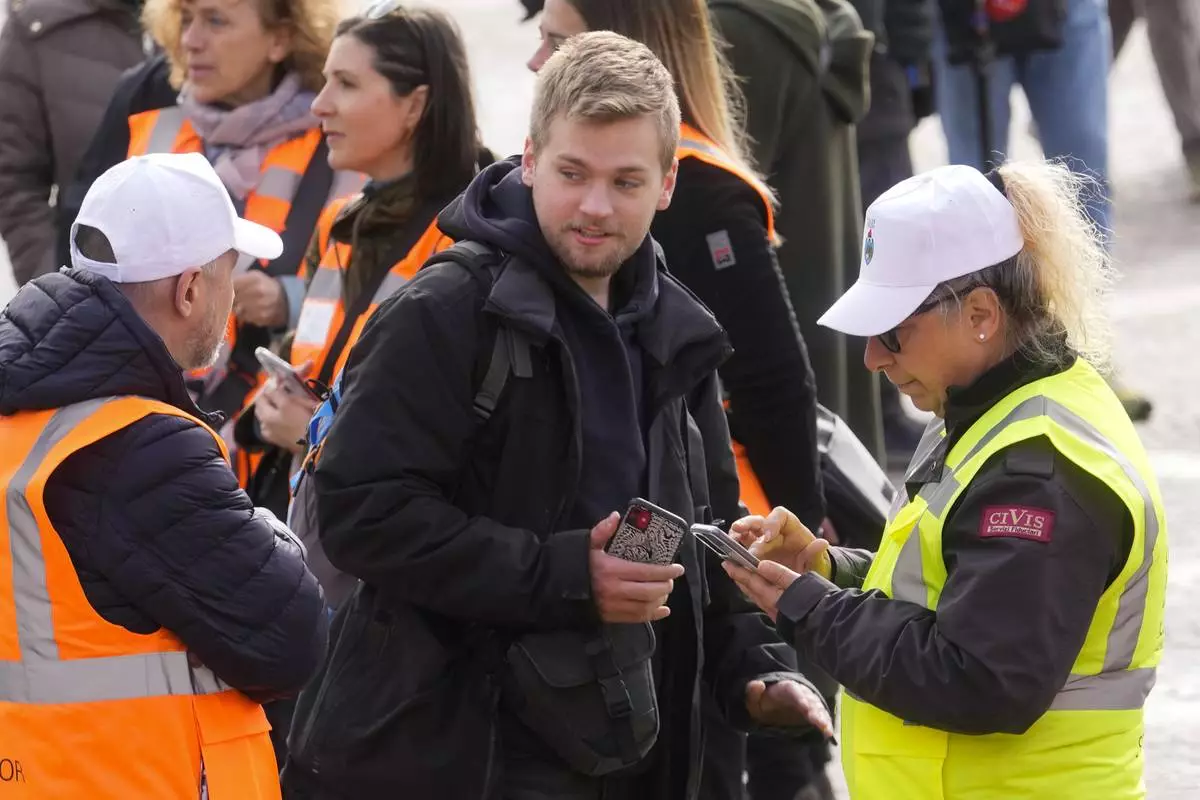
Stewards check a tourist QR code access outside the main train station in Venice, Italy, Thursday, April 25, 2024. The fragile lagoon city of Venice begins a pilot program Thursday to charge daytrippers a 5 euro entry fee that authorities hope will discourage tourists from arriving on peak days. The daytripper tax is being tested on 29 days through July, mostly weekends and holidays starting with Italy's Liberation Day holiday Thursday. Officials expect some 10,000 people will pay the fee to access the city on the first day, downloading a QR code to prove their payment, while another 70,000 will receive exceptions, for example, because they work in Venice or live in the Veneto region. (AP Photo/Luca Bruno)
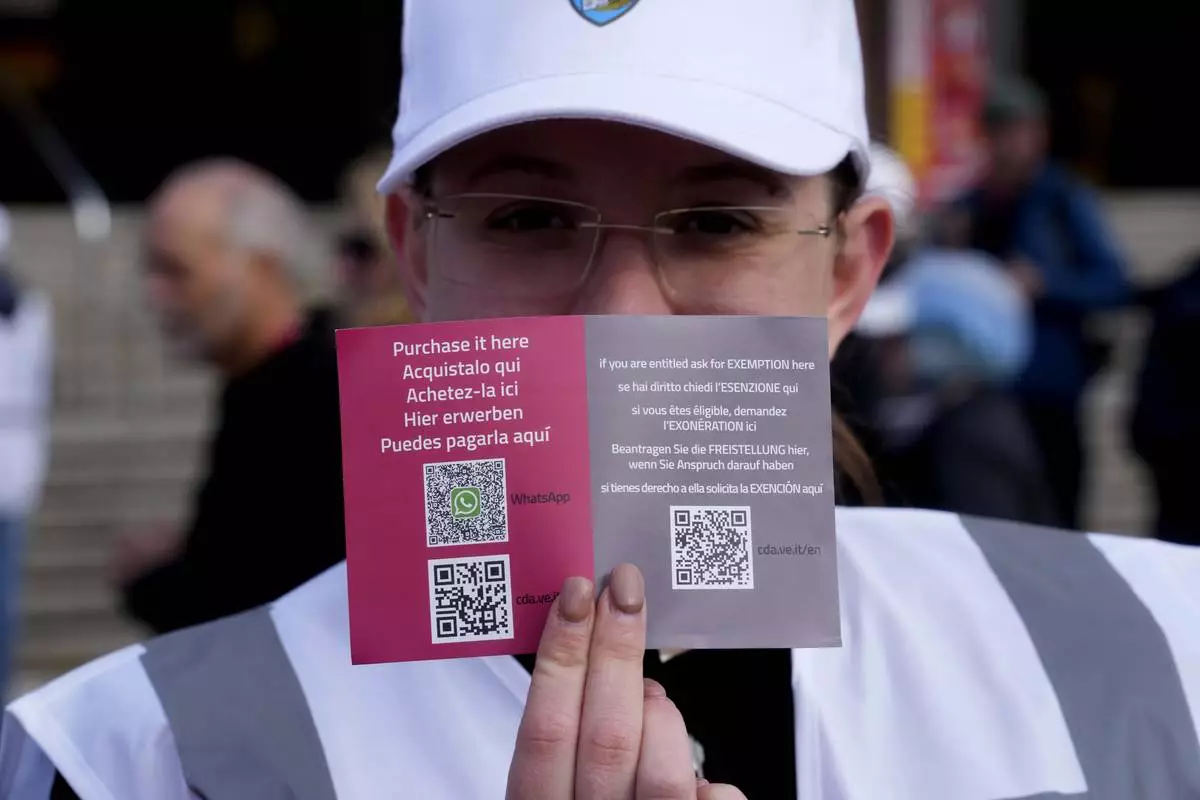
A steward shows the QR code access outside the main train station in Venice, Italy, Thursday, April 25, 2024. The fragile lagoon city of Venice begins a pilot program Thursday to charge daytrippers a 5 euro entry fee that authorities hope will discourage tourists from arriving on peak days. The daytripper tax is being tested on 29 days through July, mostly weekends and holidays starting with Italy's Liberation Day holiday Thursday. Officials expect some 10,000 people will pay the fee to access the city on the first day, downloading a QR code to prove their payment, while another 70,000 will receive exceptions, for example, because they work in Venice or live in the Veneto region. (AP Photo/Luca Bruno)
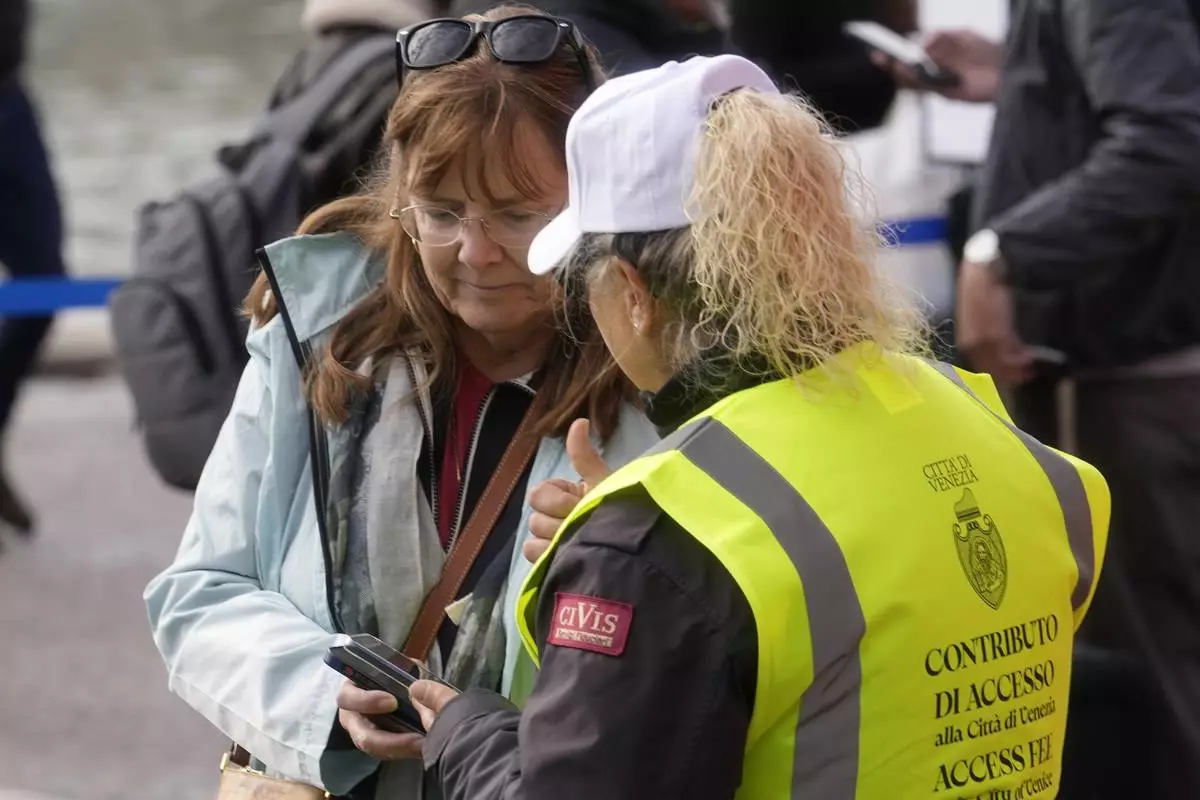
A steward checks a tourist QR code access outside the main train station in Venice, Italy, Thursday, April 25, 2024. The fragile lagoon city of Venice begins a pilot program Thursday to charge daytrippers a 5 euro entry fee that authorities hope will discourage tourists from arriving on peak days. The daytripper tax is being tested on 29 days through July, mostly weekends and holidays starting with Italy's Liberation Day holiday Thursday. Officials expect some 10,000 people will pay the fee to access the city on the first day, downloading a QR code to prove their payment, while another 70,000 will receive exceptions, for example, because they work in Venice or live in the Veneto region. (AP Photo/Luca Bruno)
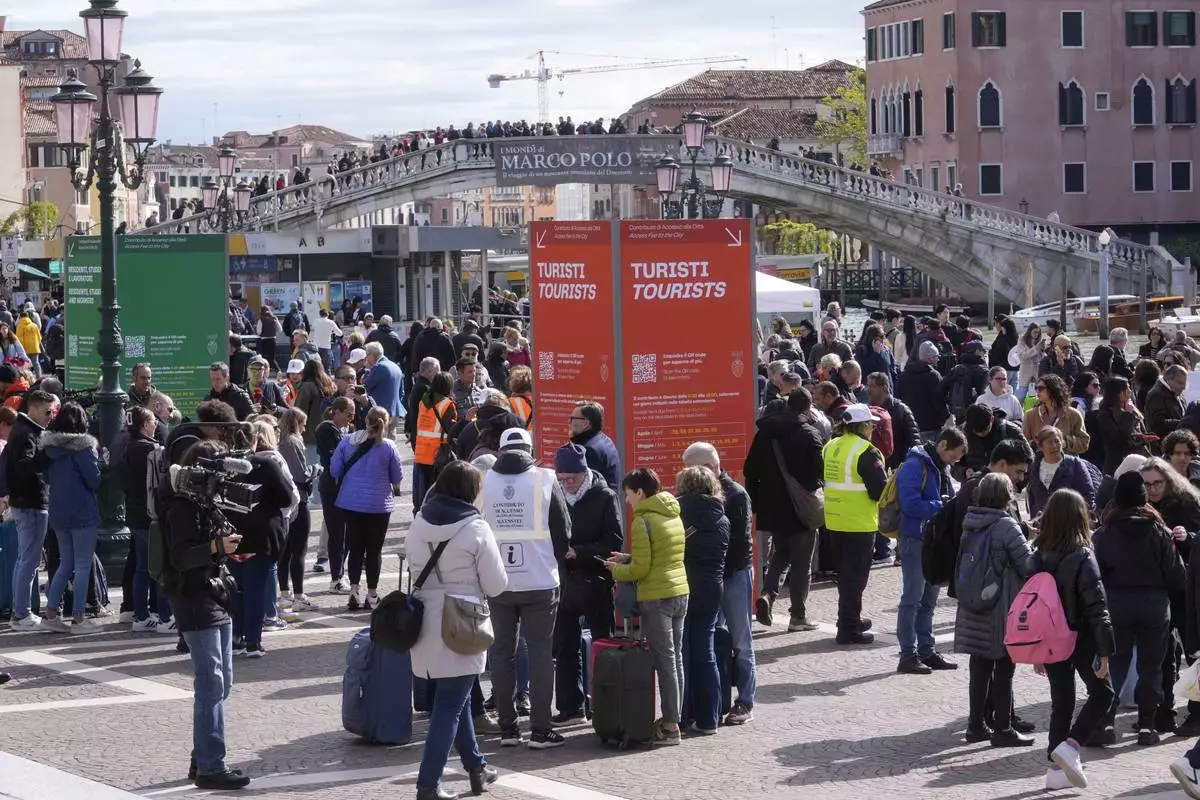
Stewards check tourists QR code access outside the main train station in Venice, Italy, Thursday, April 25, 2024. The fragile lagoon city of Venice begins a pilot program Thursday to charge daytrippers a 5 euro entry fee that authorities hope will discourage tourists from arriving on peak days. The daytripper tax is being tested on 29 days through July, mostly weekends and holidays starting with Italy's Liberation Day holiday Thursday. Officials expect some 10,000 people will pay the fee to access the city on the first day, downloading a QR code to prove their payment, while another 70,000 will receive exceptions, for example, because they work in Venice or live in the Veneto region. (AP Photo/Luca Bruno)
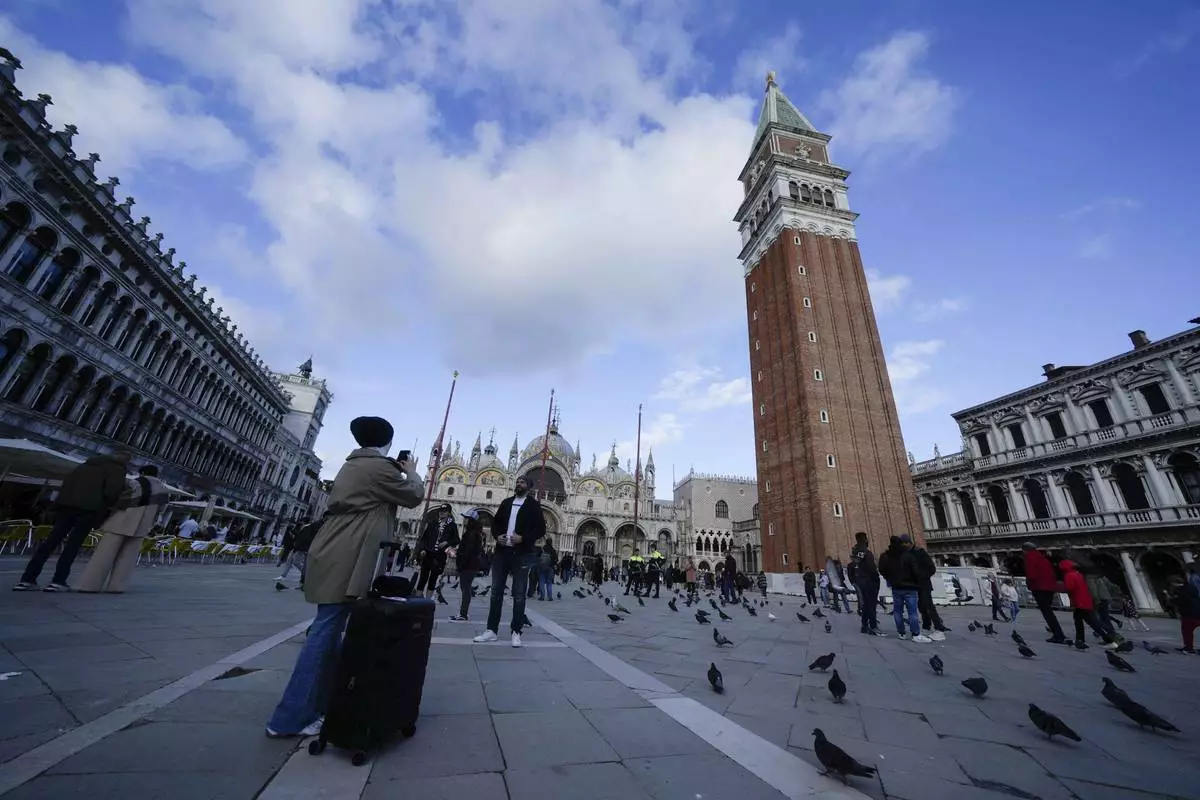
Tourists take pictures at the St. Mark square in Venice, Italy, Wednesday, April 24, 2024. The lagoon city of Venice begins a pilot program Thursday, April 25, 2024 to charge daytrippers a 5 euro entry fee that authorities hope will discourage tourists from arriving on peak days. Officials expect some 10,000 people will pay the fee to access the city on the first day, downloading a QR code to prove their payment. (AP Photo/Luca Bruno)
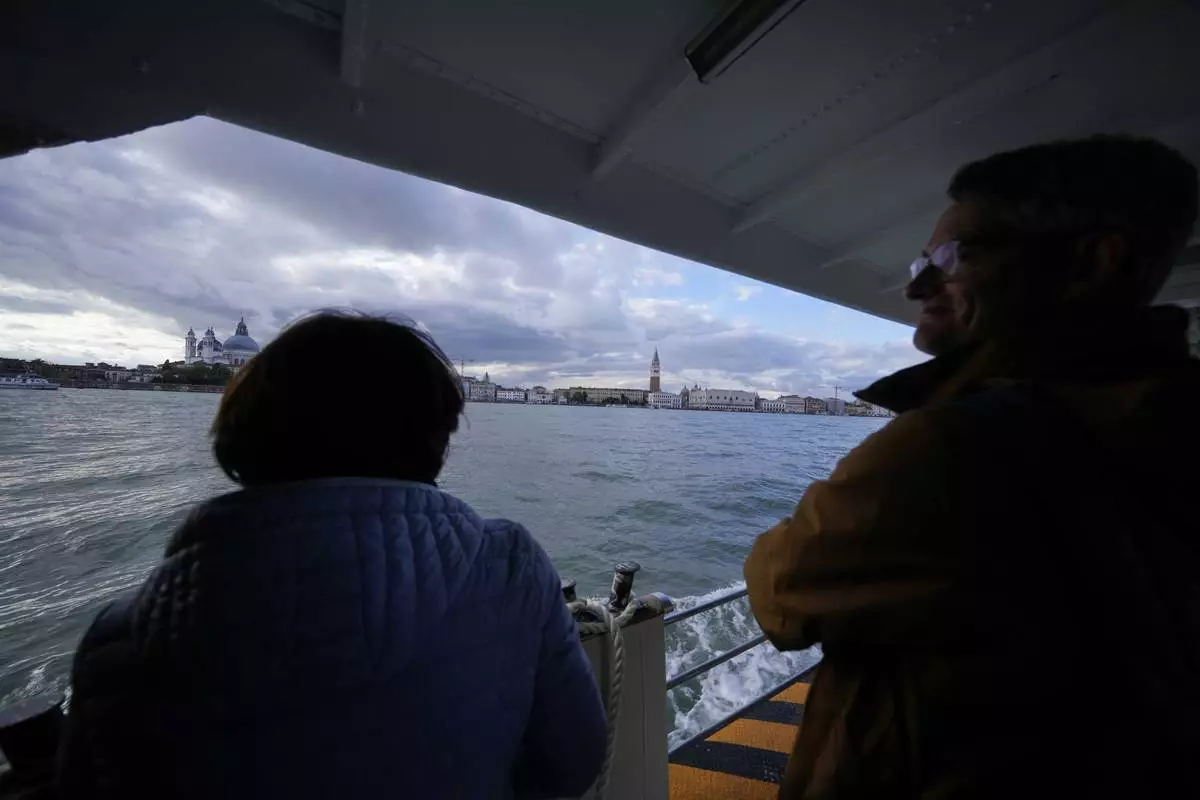
Tourists ride on a ferry boat in Venice, Italy, Wednesday, April 24, 2024. The lagoon city of Venice begins a pilot program Thursday, April 25, 2024 to charge daytrippers a 5 euro entry fee that authorities hope will discourage tourists from arriving on peak days. Officials expect some 10,000 people will pay the fee to access the city on the first day, downloading a QR code to prove their payment. (AP Photo/Luca Bruno)
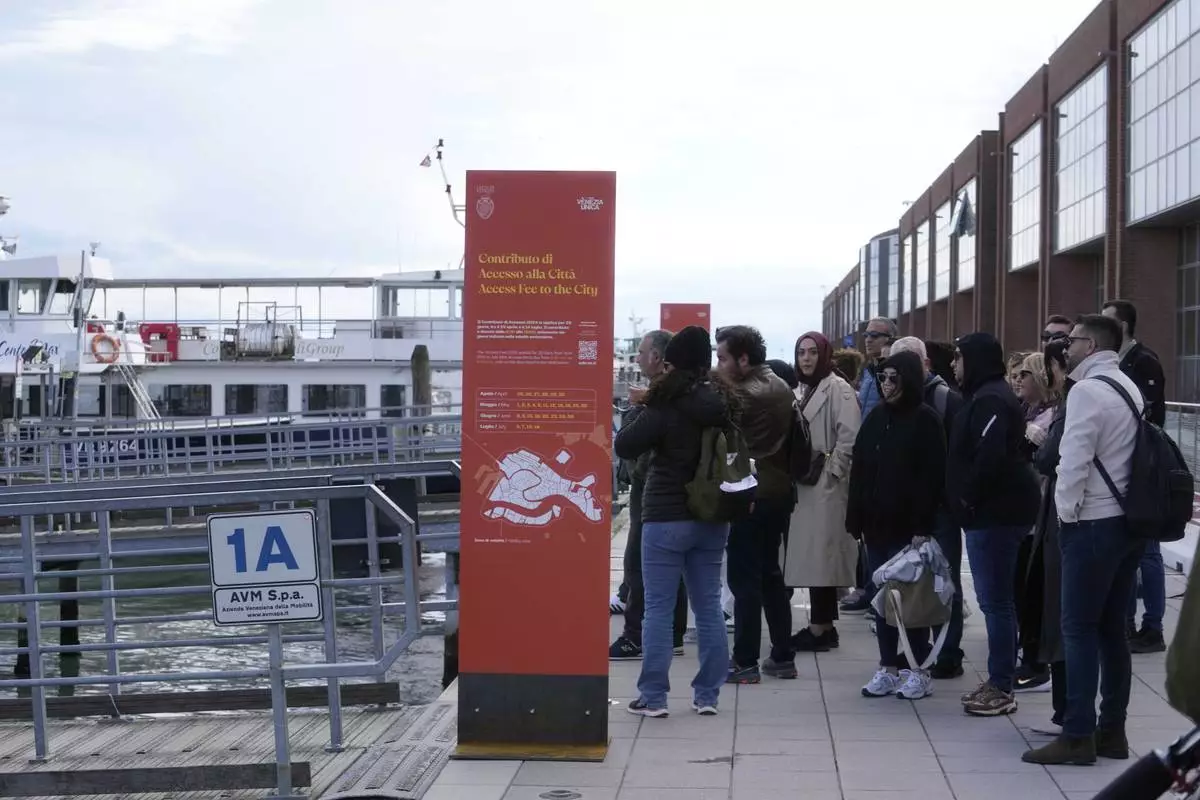
People stand in front of an information board explaining how to pay the tourist tax in Venice, Italy, Wednesday, April 24, 2024. The lagoon city of Venice begins a pilot program Thursday, April 25, 2024 to charge daytrippers a 5 euro entry fee that authorities hope will discourage tourists from arriving on peak days. Officials expect some 10,000 people will pay the fee to access the city on the first day, downloading a QR code to prove their payment. (AP Photo/Luca Bruno)
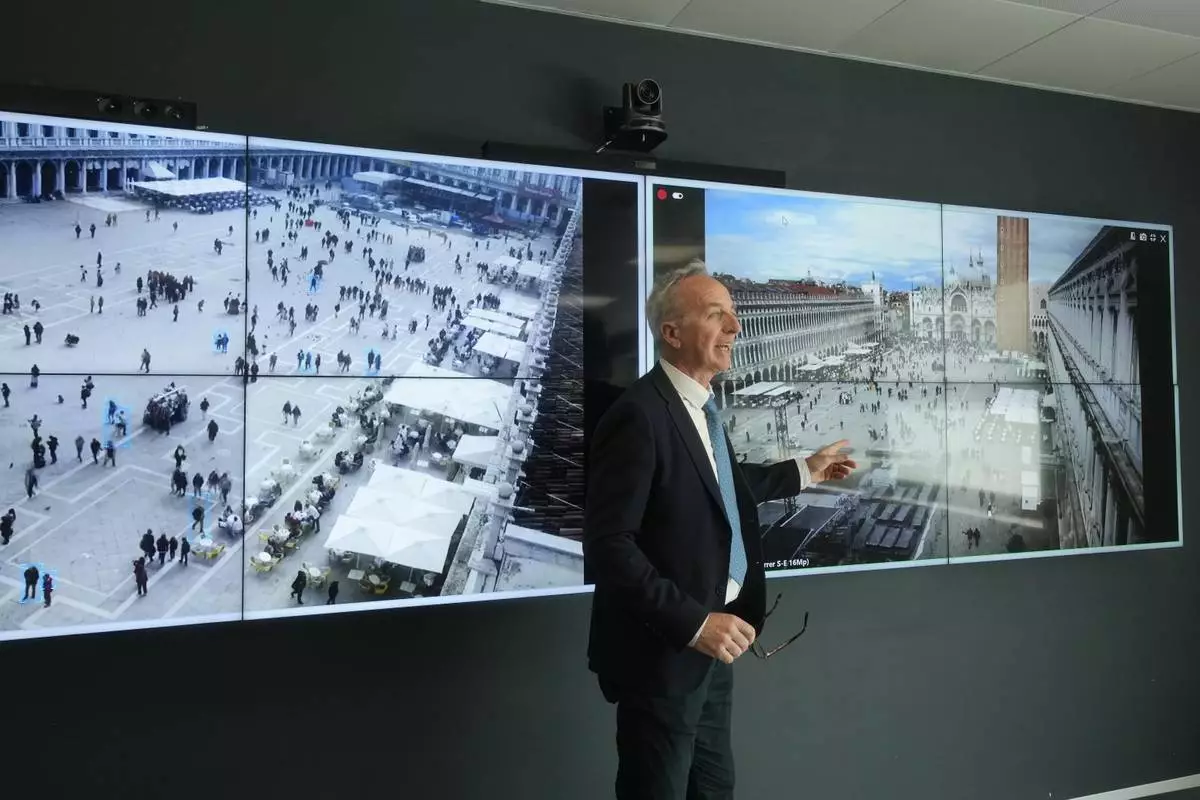
Marco Bettini, director of Venis Informatics System, gestures as he talks to reporters at the police Venice control room, in Venice, Italy, Wednesday, April 24, 2024. The lagoon city of Venice begins a pilot program Thursday, April 25, 2024 to charge daytrippers a 5 euro entry fee that authorities hope will discourage tourists from arriving on peak days. Officials expect some 10,000 people will pay the fee to access the city on the first day, downloading a QR code to prove their payment. (AP Photo/Luca Bruno)
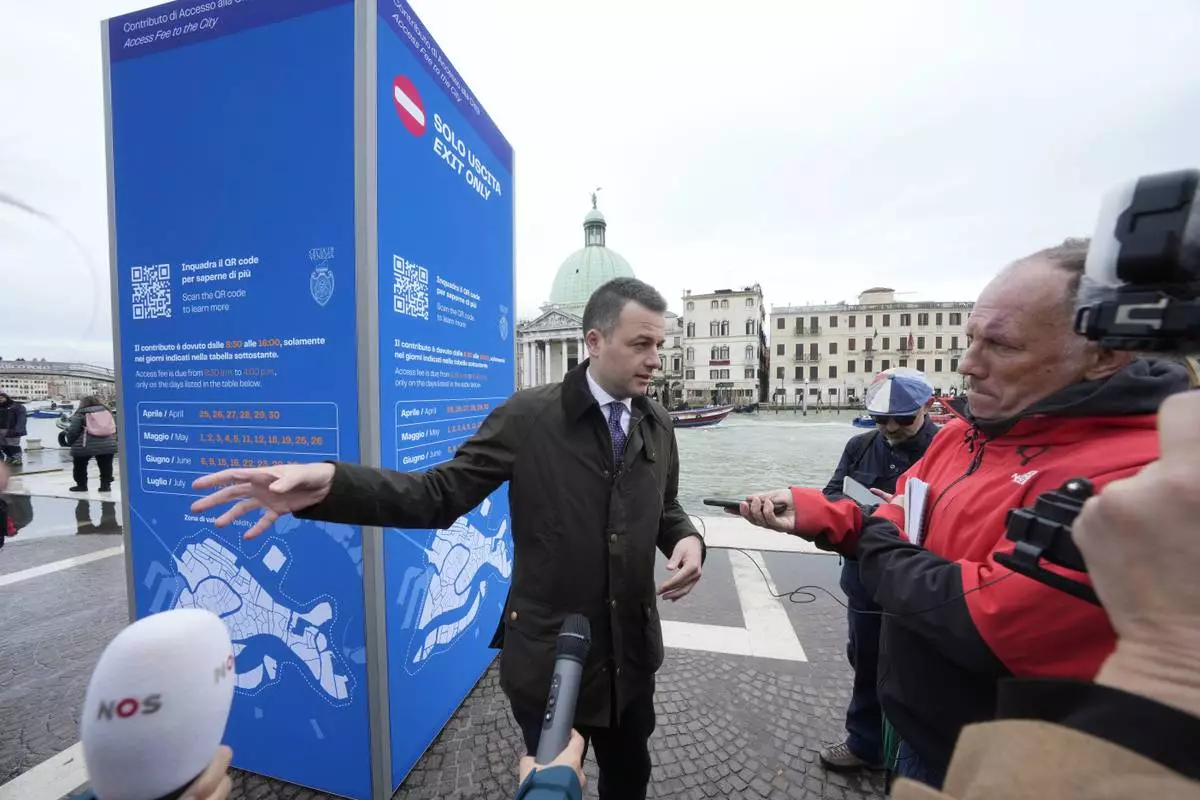
Venice councillor Simone Venturini speaks with reporters in front of a tourist tax totem in Venice, Italy, Wednesday, April 24, 2024. The lagoon city of Venice begins a pilot program Thursday, April 25, 2024 to charge daytrippers a 5 euro entry fee that authorities hope will discourage tourists from arriving on peak days. Officials expect some 10,000 people will pay the fee to access the city on the first day, downloading a QR code to prove their payment. (AP Photo/Luca Bruno)
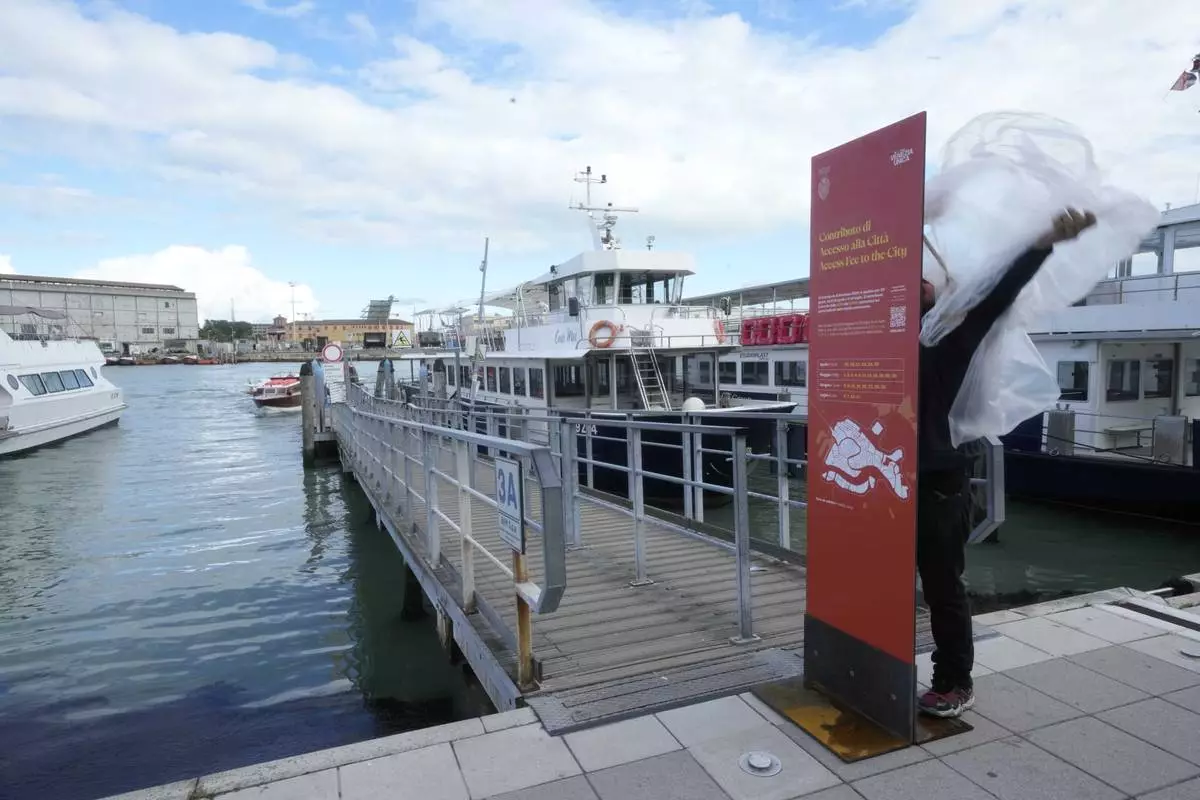
Workers prepare banner explaining how to pay the tourist tax in Venice, Italy, Wednesday, April 24, 2024. The lagoon city of Venice begins a pilot program Thursday, April 25, 2024 to charge daytrippers a 5 euro entry fee that authorities hope will discourage tourists from arriving on peak days. Officials expect some 10,000 people will pay the fee to access the city on the first day, downloading a QR code to prove their payment. (AP Photo/Luca Bruno)
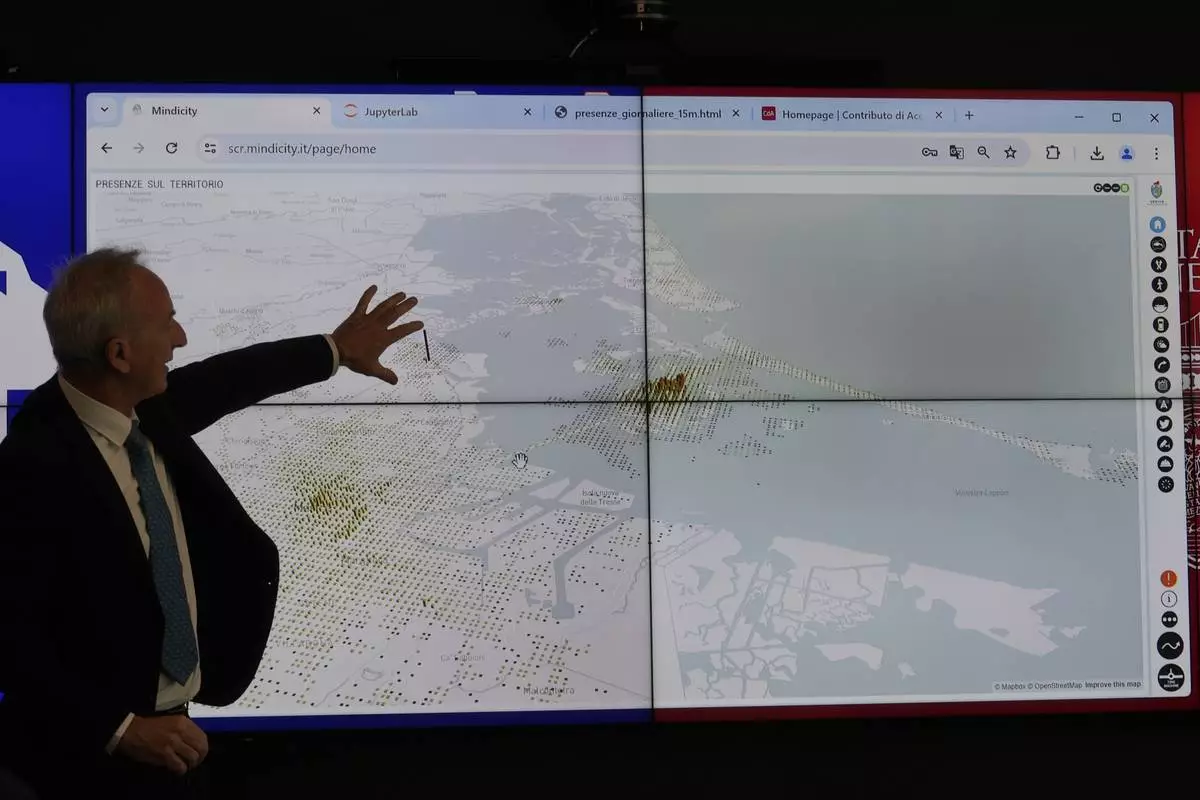
Marco Bettini, director of Venis Informatics System, gestures as he explains the Venice density to reporters at the police Venice control room in Venice, Italy, Wednesday, April 24, 2024. The lagoon city of Venice begins a pilot program Thursday, April 25, 2024 to charge daytrippers a 5 euro entry fee that authorities hope will discourage tourists from arriving on peak days. Officials expect some 10,000 people will pay the fee to access the city on the first day, downloading a QR code to prove their payment. (AP Photo/Luca Bruno)
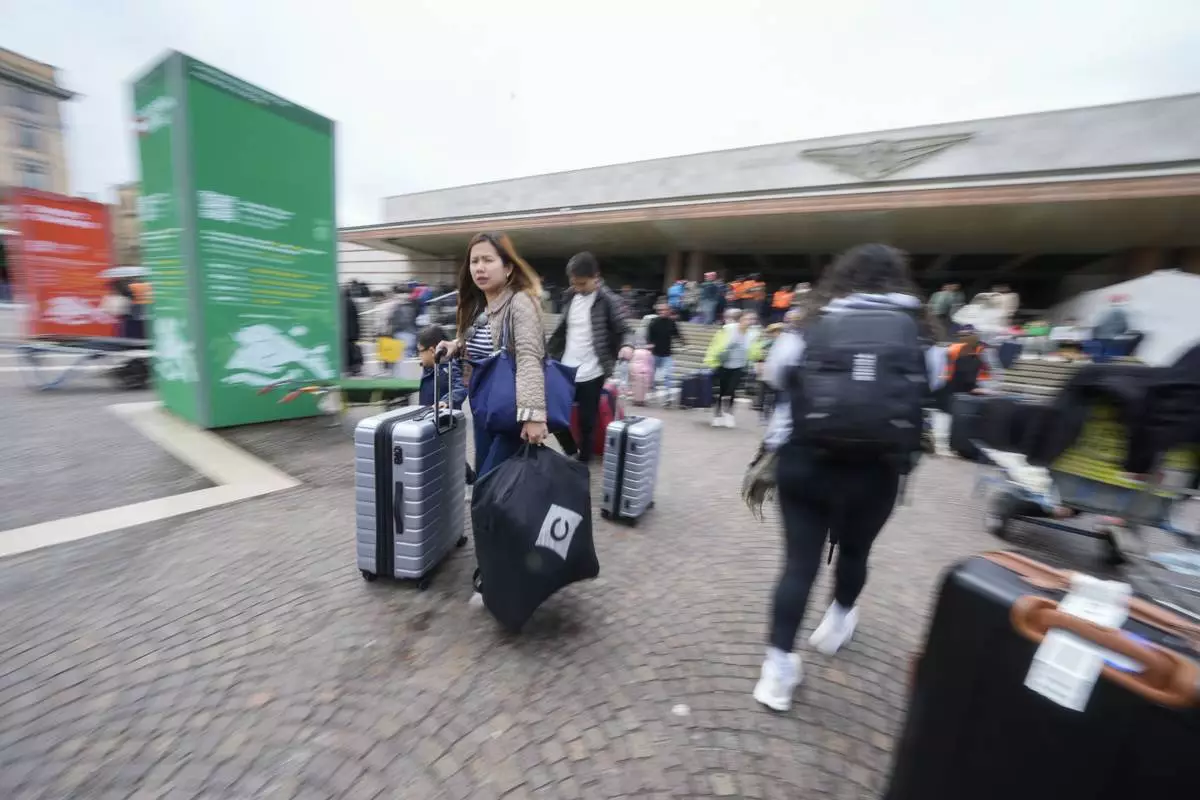
Tourists arrive at the main train station in Venice, Italy, Wednesday, April 24, 2024. The lagoon city of Venice begins a pilot program Thursday, April 25, 2024 to charge daytrippers a 5 euro entry fee that authorities hope will discourage tourists from arriving on peak days. Officials expect some 10,000 people will pay the fee to access the city on the first day, downloading a QR code to prove their payment. (AP Photo/Luca Bruno)
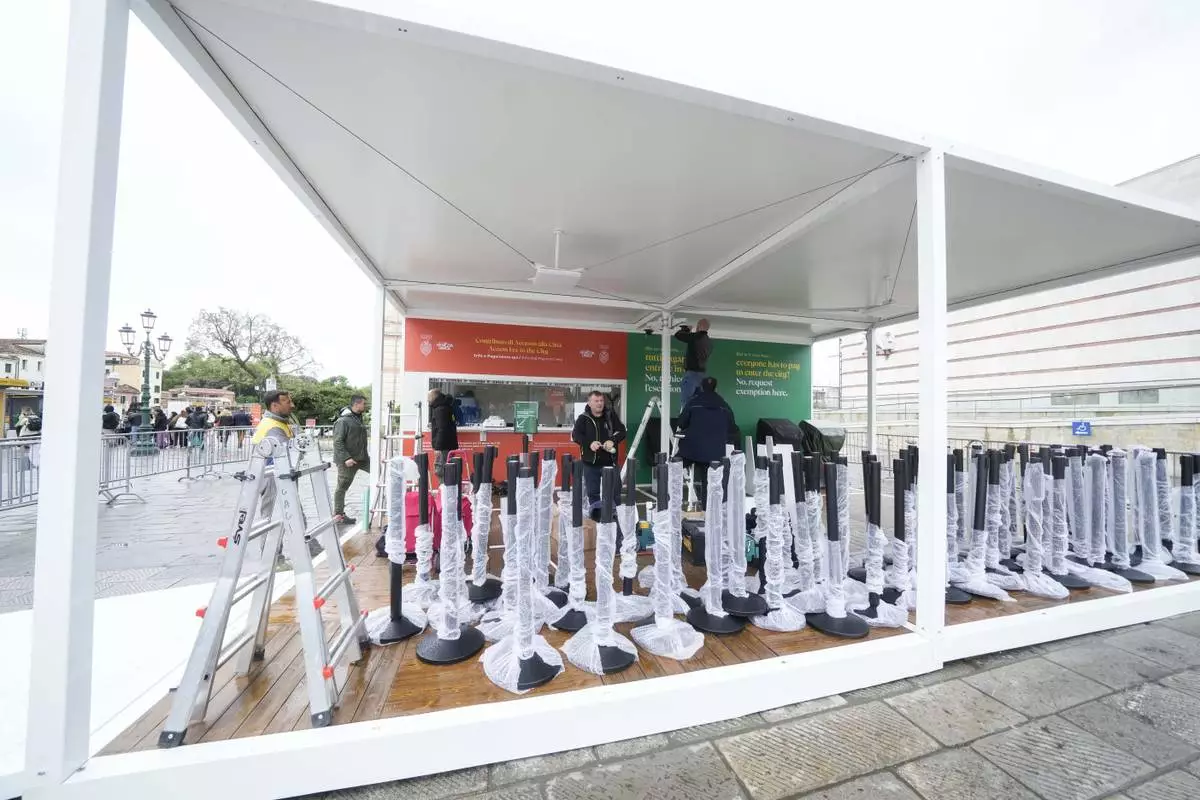
Workers prepare the tourist tax cashier desks outside the main train station in Venice, Italy, Wednesday, April 24, 2024. The lagoon city of Venice begins a pilot program Thursday, April 25, 2024 to charge daytrippers a 5 euro entry fee that authorities hope will discourage tourists from arriving on peak days. Officials expect some 10,000 people will pay the fee to access the city on the first day, downloading a QR code to prove their payment. (AP Photo/Luca Bruno)
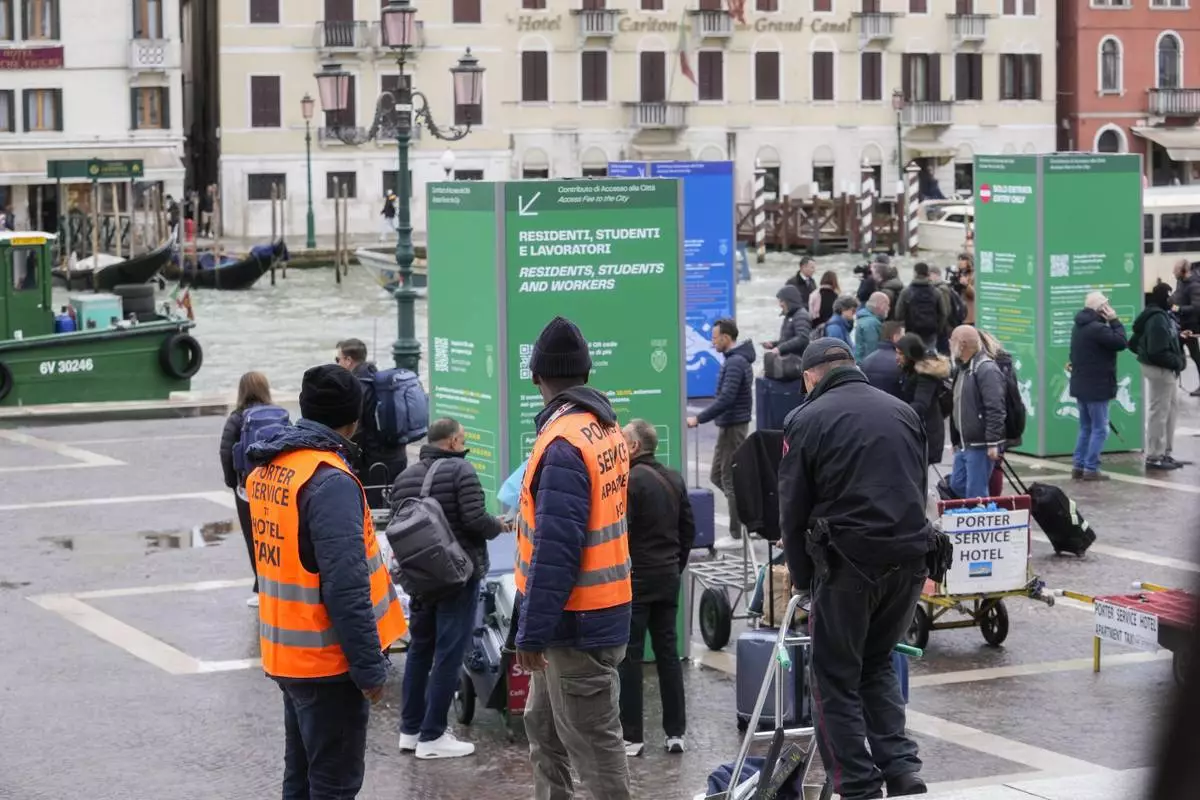
Porters wait for tourists outside the main train station in Venice, Italy, Wednesday, April 24, 2024. The lagoon city of Venice begins a pilot program Thursday, April 25, 2024 to charge daytrippers a 5 euro entry fee that authorities hope will discourage tourists from arriving on peak days. Officials expect some 10,000 people will pay the fee to access the city on the first day, downloading a QR code to prove their payment. (AP Photo/Luca Bruno)
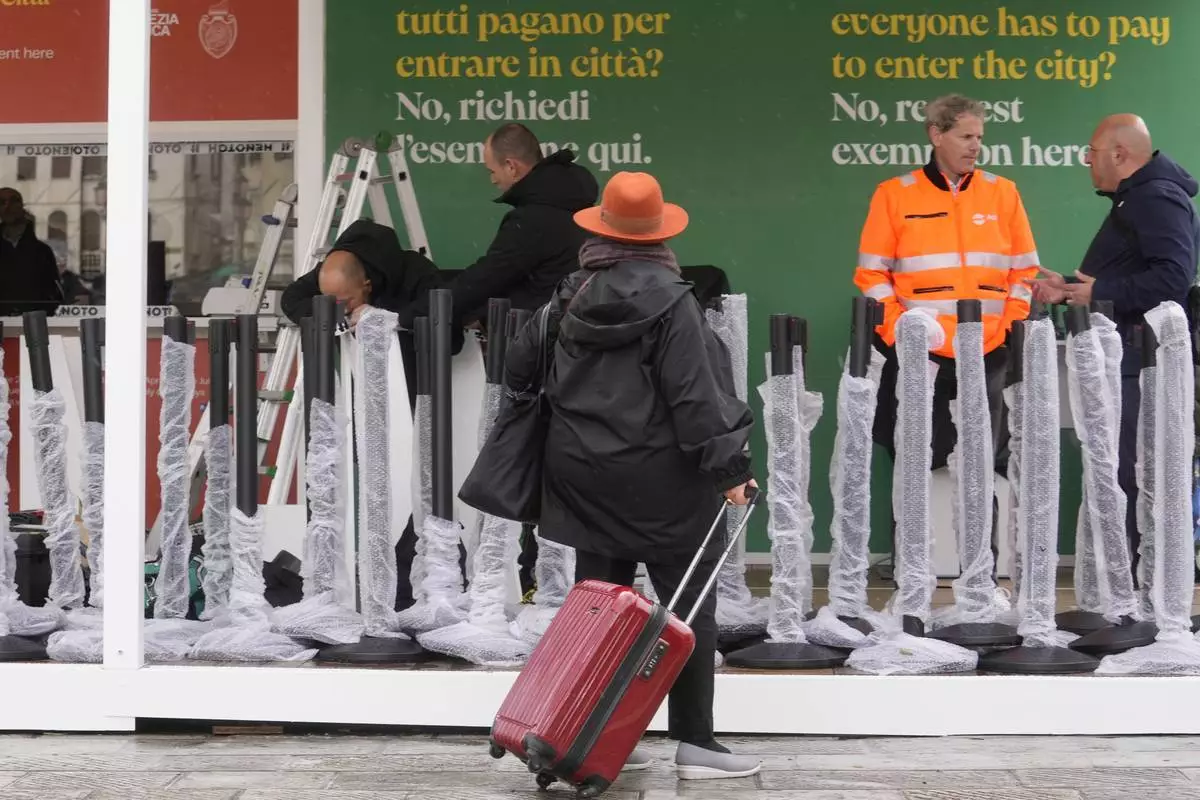
Workers prepare the tourist tax cashier desks outside the main train station in Venice, Italy, Wednesday, April 24, 2024. The lagoon city of Venice begins a pilot program Thursday, April 25, 2024 to charge daytrippers a 5 euro entry fee that authorities hope will discourage tourists from arriving on peak days. Officials expect some 10,000 people will pay the fee to access the city on the first day, downloading a QR code to prove their payment. (AP Photo/Luca Bruno)
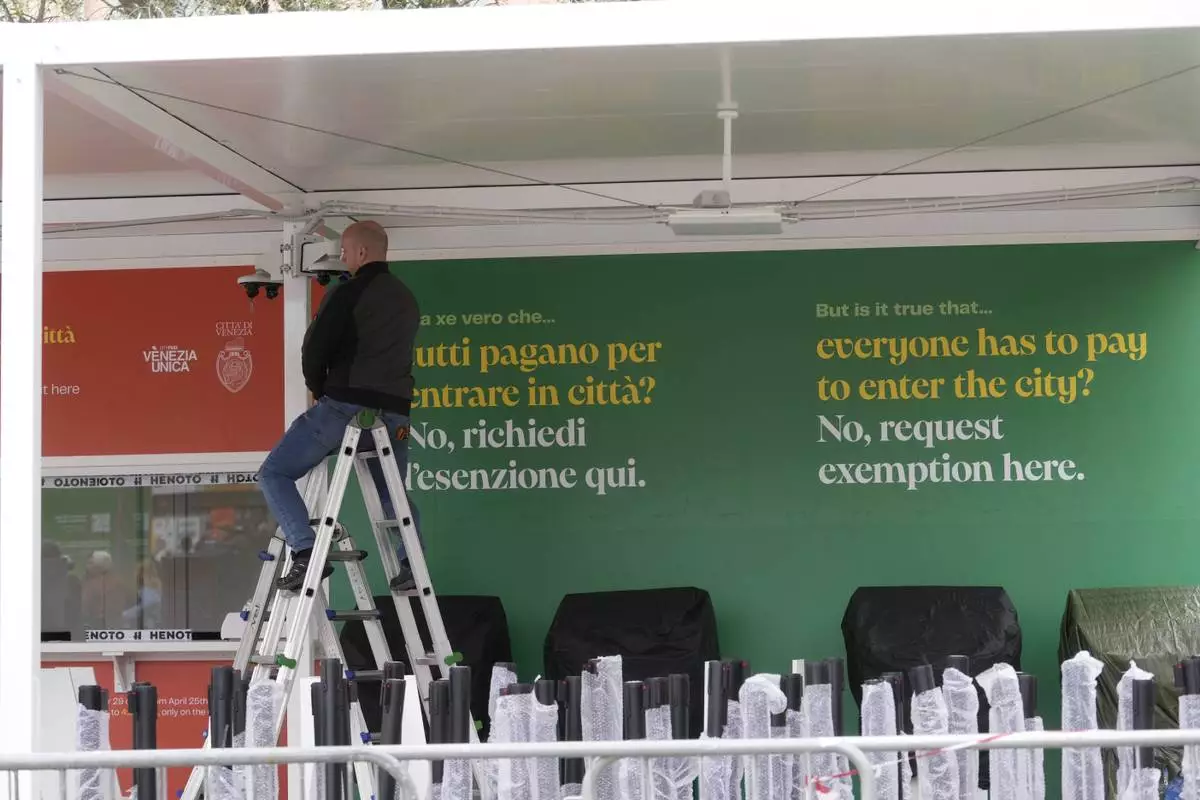
Workers prepare the tourist tax cashier desks outside the main train station in Venice, Italy, Wednesday, April 24, 2024. The lagoon city of Venice begins a pilot program Thursday, April 25, 2024 to charge daytrippers a 5 euro entry fee that authorities hope will discourage tourists from arriving on peak days. Officials expect some 10,000 people will pay the fee to access the city on the first day, downloading a QR code to prove their payment. (AP Photo/Luca Bruno)
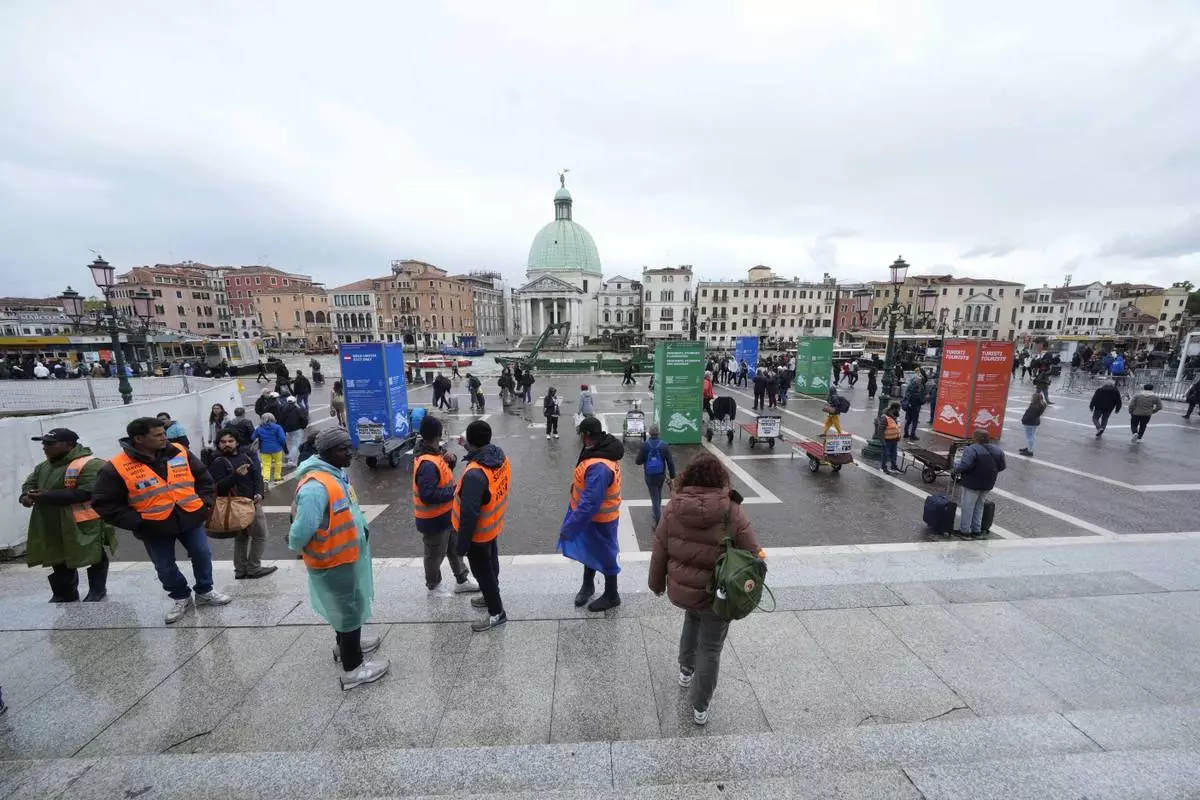
Porters wait for tourists outside the main train station in Venice, Italy, Wednesday, April 24, 2024. The lagoon city of Venice begins a pilot program Thursday, April 25, 2024 to charge daytrippers a 5 euro entry fee that authorities hope will discourage tourists from arriving on peak days. Officials expect some 10,000 people will pay the fee to access the city on the first day, downloading a QR code to prove their payment. (AP Photo/Luca Bruno)
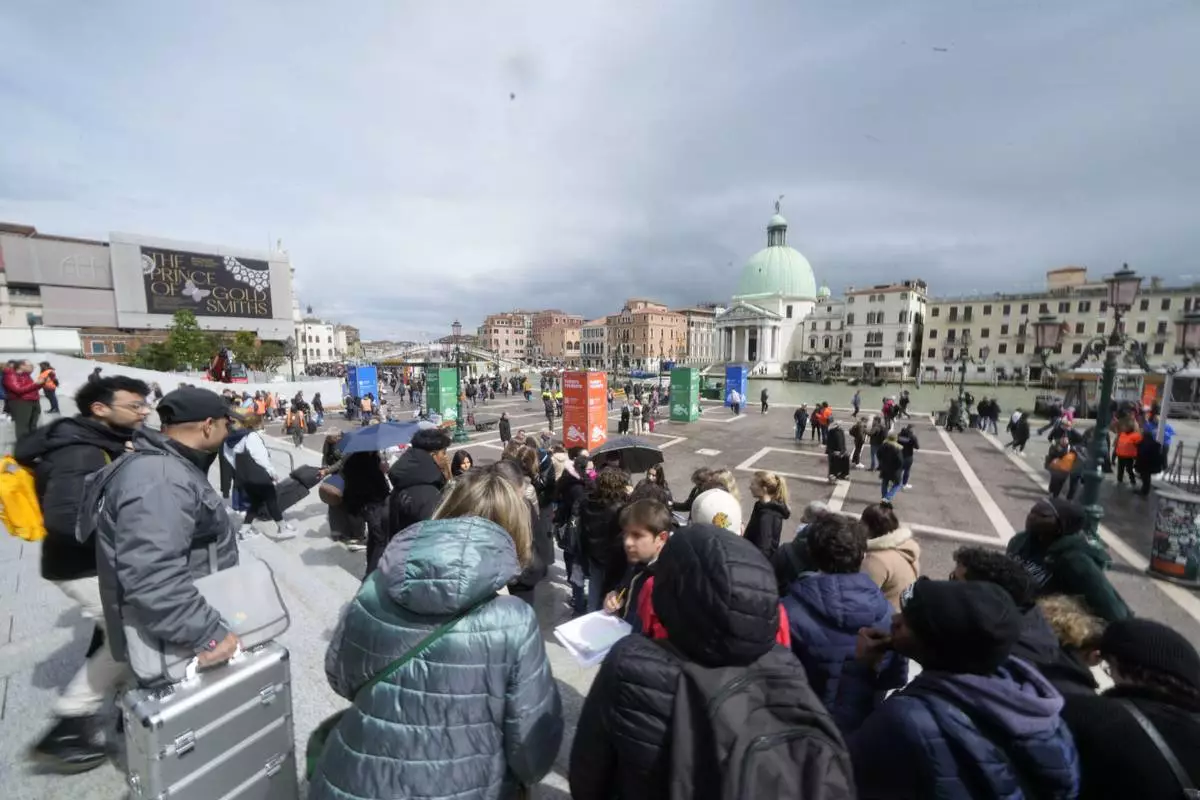
Tourists arrive outside the main train station in Venice, Italy, Wednesday, April 24, 2024. The lagoon city of Venice begins a pilot program Thursday, April 25, 2024 to charge daytrippers a 5 euro entry fee that authorities hope will discourage tourists from arriving on peak days. Officials expect some 10,000 people will pay the fee to access the city on the first day, downloading a QR code to prove their payment. (AP Photo/Luca Bruno)
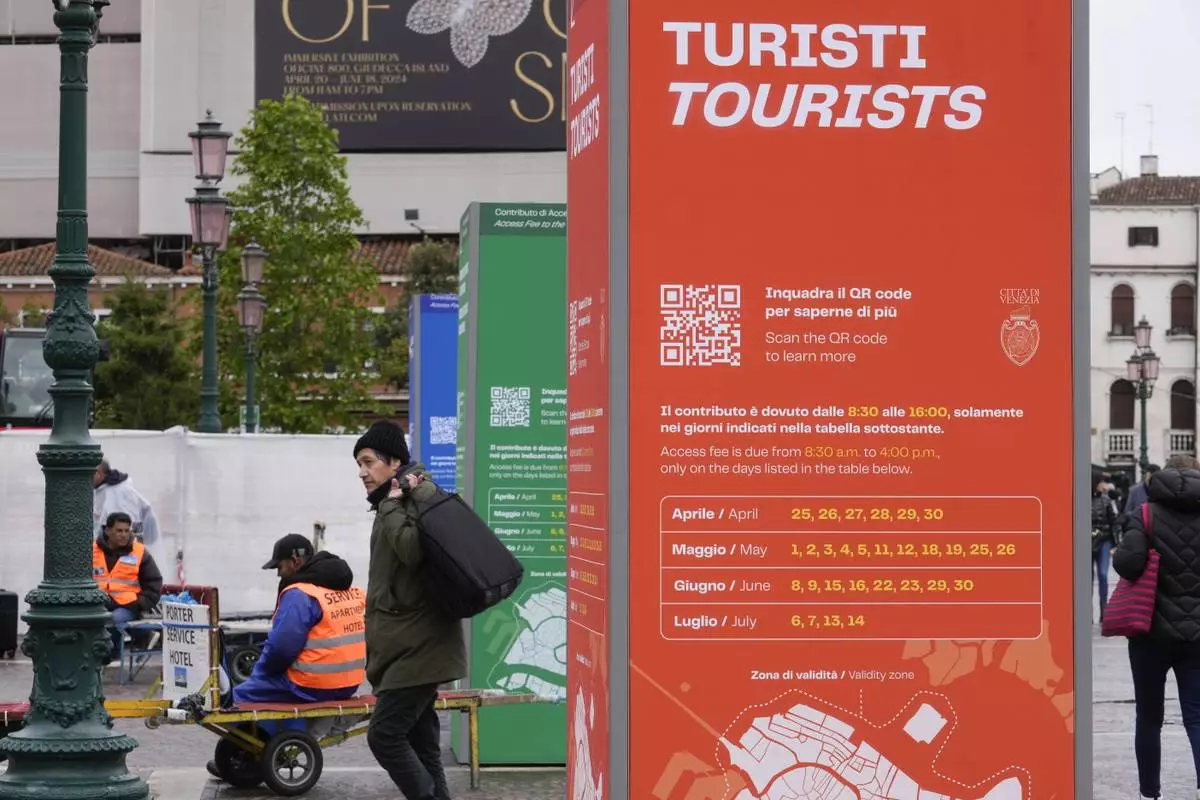
Tourist information boards are seen outside the main train station in Venice, Italy, Wednesday, April 24, 2024. The lagoon city of Venice begins a pilot program Thursday, April 25, 2024 to charge daytrippers a 5 euro entry fee that authorities hope will discourage tourists from arriving on peak days. Officials expect some 10,000 people will pay the fee to access the city on the first day, downloading a QR code to prove their payment. (AP Photo/Luca Bruno)
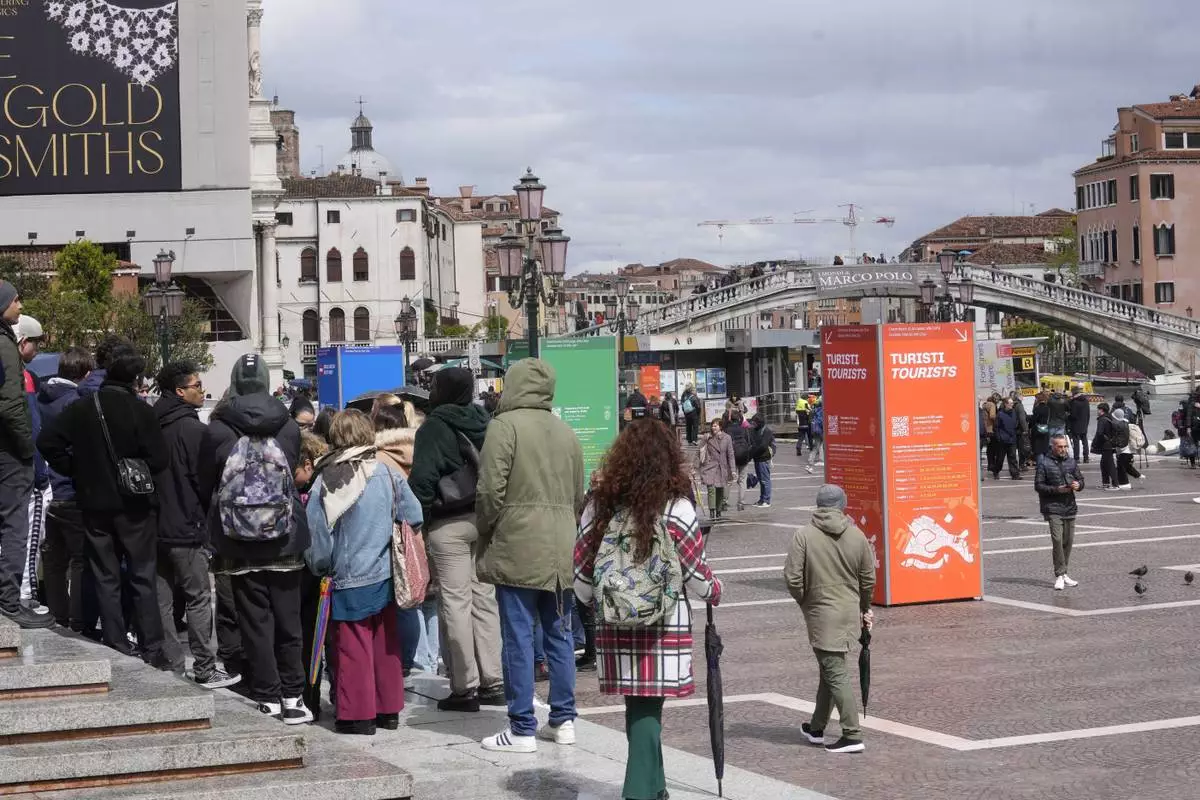
Tourists arrive outside the main train station in Venice, Italy, Wednesday, April 24, 2024. The lagoon city of Venice begins a pilot program Thursday, April 25, 2024 to charge daytrippers a 5 euro entry fee that authorities hope will discourage tourists from arriving on peak days. Officials expect some 10,000 people will pay the fee to access the city on the first day, downloading a QR code to prove their payment. (AP Photo/Luca Bruno)

































